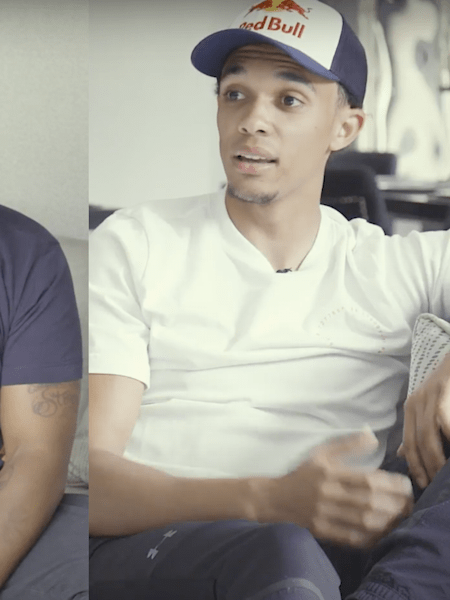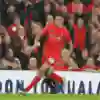As a kid, Trent Alexander-Arnold used to stand on the roof of his mum's car in order to peer over the walls of Liverpool FC’s Melwood Training Ground. He just wanted to get a glimpse of his heroes. Young Trent could hardly have imagined that one day he too would be the toast of the Kop, let alone an established England international regarded as one of the finest fullbacks on the planet.
Speaking to Ian Wright in an exclusive interview for Red Bull TV, it’s clear that Trent is not taking his rocket-like rise for granted: “I’m living the dream of everyone – grown men, grandparents, parents, kids, teenagers.”
During the interview – filmed the day after Liverpool's 2019-20 title triumph was confirmed – TAA covers his whole story to date. Just how did he maximise his talents on the perilous road of youth football? What made him so nervous he couldn’t sleep before his first team debut? And precisely how warm and safe does a hug from Jürgen Klopp feel?
For all these answers and more, read on…
When I was too young to train with my brother, I’d copy the drills
“I remember being four or five years old, watching my older brother [Tyler] on Astroturf pitches in training groups on Saturday mornings. I’d be stood on the fence and crying every time because I was too young to join in, but because I was seeing what they were doing. I’d then go home and copy it, setting up the same drills.”
My mum let me stand on her car to watch Liverpool train
“Our childhood house was two minutes from Melwood [Liverpool’s training ground], so we’d see the fancy supercars going past with the tinted windows and wonder which footballer was in it. Mum’s hairdressers was directly next door to Melwood, and my brothers and I would have to go and sit in the salon while she was having her hair done, so if we behaved ourselves she’d drive past Melwood and stop so we could try to get a glimpse through a little crack in the wall, or jump on a wheelie bin, or jump on the car – we were obsessed with wanting to see the players.”
I’m living the dream
I had no ‘off switch’ as a kid
“When my little brother came along [Marcel] and there were three of us, we played football all the time. It was non-stop apart from school hours. We’d play 4pm till 7pm just out in the garden. If it was raining, we’d go inside and play in the hallway using doorways as goals. One would use the front door, and one would use the dining room door, and you had to score with a pair of socks or ball or whatever.”
My training secret is to make everything a competition
“I’ve always found the competitive side of playing to be really beneficial. If I want to work on long-range passing, then I’ll turn it into a competition as that’s how I get the best out of myself. I’ll challenge someone, saying: ‘I bet you can’t do this’, and make sure that mine’s better. It’s mad – if we’re walking off the pitch for drinks before the next drill and someone’s hitting a loose ball, I’ll give them a little task as they hit it – ‘left foot’ - making sure they have to hit it with their left foot. And if not, to let me have a go.”
I idolised Gerrard
The fear of losing has driven me on
“[When I lost a game at youth level] I’d feel like I’d let everyone down – my mum watching on the side, my brothers, my team-mates, my managers. It was on me to make sure we won, and I enjoyed that; I wanted to be the matchwinner, the one everyone was talking about, to win all of the awards and be top scorer. I always knew I was one of the best players in my age groups, but I was never number one, always top three. I hated it. What set me apart from everyone else was my competitiveness, always wanting to win more than anyone else. There was nobody in any team that I’ve played in who felt the same pain when we got beat or lost in training.”
Steven Gerrard always seemed superhuman to me
“I idolised Gerrard. He was everything to me when I was growing up. I just wanted to be him, to live how he lived, play like how he played. Whenever the ball dropped, I’d be screaming ‘Gerrard!’ as I hit it. A lot of kids in the city would do the same thing, but for me it was an obsession. You know when you don’t think somebody’s human, because you’ve built them up so much you don’t even feel like they’re a real person, and you don’t think it’s possible to be that amazing, to be that special, talented? Aged eight, the club gave us complimentary tickets to the player’s lounge for a Champions League game. He walked into the room and I haven’t felt that same feeling since. We got a picture and he was amazing with us.”
He was first down to breakfast on the morning of his first team debut
“Youth football is so, so different to senior football. You get told what to do and you have to do it, whereas in senior football, it’s more in your own time. I was too scared to even have a nap ahead of my debut. I didn’t know the routine. They told me breakfast was 8am to 10.30am. I was thinking, ‘Do you have to be there at 8am or do I have to be there at 10.30am?’ I got there at five minutes past eight, not a soul there, the chefs still setting up, looking at me like I’ve got two heads, like, ‘Why’s this kid down here so early?’ I was so nervous. [Christian] Benteke also made his debut that day [a pre-season match vs. Swindon in 2005] but I don’t even think I spoke to anyone before it.”
The number 66 is entirely random
“I didn’t pick my shirt number. I just went into the changies’ on my first team debut and it was there. You take a step back, like, ‘Woah, that’s my name’, because you don’t have your name on your shirt in the academy, just a number. To then go into a dressing room and have your name on your shirt is nuts. And because it’s 66, people think it might have some deeper meaning, but it’s random and I like it.”
A Jurgen Klopp hug is as warm as you would imagine
“It’s not just a hug for hug’s sake. You know when you want to make someone proud? It just feels like that – he’s such a special person. I always respect when a team buys into what the manager believes in. What makes great managers is being able to motivate players and get them to all buy into one philosophy that they feel is going to work. What you see is what you get, he’s not fake in any way, shape or form. He wears his heart on his sleeve, you can see how he’s feeling and sense what mood he’s in. Even when things aren’t going well there’s still a belief and mentality that we can change things.”
Lockdown was the most mentally draining moment of my career
“Nothing was certain in lockdown [first UK national lockdown introduced in March] It was difficult mentally. Doubt started to creep in about whether we were going to play again or not. Then you get put on another three weeks of lockdown, so you aren’t going to play for another five weeks, say. It was hard to keep motivated. You wonder if you should keep running. Nothing like this had ever happened before. The only scenario I can relate it to is if you’re a player without a club but you’re trying to stay fit not knowing if another club’s going to come in for you.”






